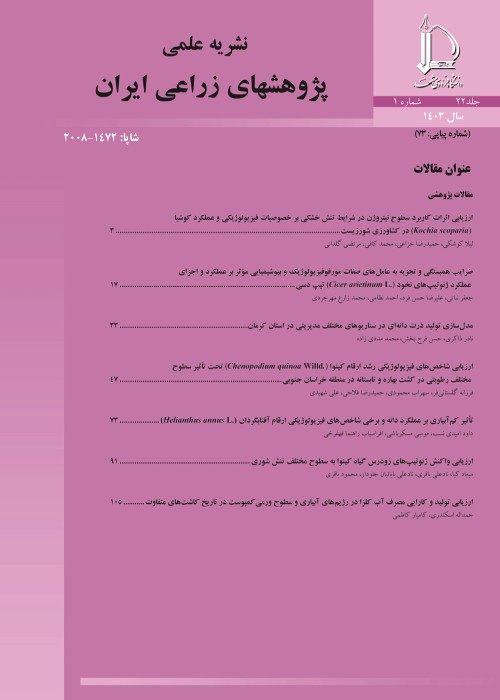Effect of Seed Priming on Growth and Some Physiological Characteristics of Sesame (Sesamum indicum L.) under salinity Stress Condition caused by Alkali Salts
Author(s):
Abstract:
Introduction
Sesame (Sesamun indicum L.) is an important oil seed crop. Its seed has excellent nutritional value with a high and unique protein composition, making it a perfect food. Salinity is a serious problem in many regions of the world including Iran. Salinity stress is one of the widespread environmental constraints affecting crop productivity. Salinity generally induces osmotic stress and causes direct ion injury by disrupting ion homeostasis and the ion balance within plant cells (25). Seed priming is one of the ways to reduce negative effects of salt which is used for increasing germination percentage and seed resistance in salty zones. Seed priming is a pre-germination treatment that provides a moisture level sufficient to start pre-germination metabolic processes. It entails the partial germination of seeds by soaking them in water (or in a solution of salts) for specified period of time, and then re-dry them just before radicle emerges (24). Priming stimulates many of the metabolic processes involved with the early phases of germination. Given that part of the germination processes have been initiated, seedlings from primed seed grow faster, grow more vigorously, and perform better in adverse conditions (24). The objective of this study was to investigate the effects of salinity stress caused by alkali salts on growth and some physiologic characteristics of sesame. Materials And Methods
This study was conducted in a greenhouse in Vali-e-Asr University of Rafsanjan as factorial arrangement in randomized complete block design with three replications. Experimental factors included priming (control (unprimed), hydropriming, halopriming with NaCl and NaHCO3 and level of salinity with sodium bicarbonate salt (Zero, 15, 30 and 45 mM). Seeds were planted in pots filled with perlite and cocopite (1:1). The pots were irrigated with a nutrient solution (with half strength Hoagland's solution). After the fourth true leaves appeared, salinty stress in the pot were created by adding NaHCO3, to half strength Hoagland’s solution. Control plants were only irrigated with half strength Hoagland’s solution. Plants were harvested after 45 days of seed sowing. After forty five days, shoot and root height, shoot and root dry weight, relative water content, Fv/Fm, chla, chlb, total chlorophyll, cartonoied content, potassium, sodium content and sodium to potassium, calcium and magnesium content were measured. Results And Discussion
Results showed that salinity stress decreased shoot and root height and also shoot dry weight. Valdez-Aguilar and Reed (33) reported a decrease in Phasaeolus vulgaris L. growth with increasing sodium bicarbonate salt. By increasing sodium bicarbonate, salt relative water content decreased. Also, the decreases in relative water content have been reported in wheat under salinity stress caused by alkali condition (15). Salinity stress decreased leaf chlorophyll content and Fv/Fm. Similarly, Guo et al., (16) observed a decrease in leaf chlorophyll content and Fv/Fm with increasing sodium bicarbonate salt. Different treatments of priming increased root height and shoot dry weight compared with unprimed treatment with increasing salinity stress. Iqbal and Ashraf (18) indicated that priming increased growth in wheat under salinity stress caused by alkali condition. Moreover, relative water content, chlb content and Fv/Fm increased under different treatments of priming and stress. It seem that under stress condition, plants with maintain relative water content, chlb content and Fv/Fm, decreased the harmful effect stress. The highest shoot dry weight, relative water content, chlb content and Fv/Fm was observed at hydropriming treatment. Although salinity stress decreased K+ concentration and K+/Na+, but the Na+, Ca2+ and Mg2+ concentration increased. Zhang and Chun-Sheng (39) concluded that by increasing sodium bicarbonate salt, potassium content decreased in Lathyrus quinquenervius, whereas sodium and sodium to potassium ratio increased. Moreover, the increases in calcium and magnesium content have been indicated in sunflower (22) and wheat (15) under salinity stress caused by alkali condition. Hydropriming increased K+ concentration and K+/Na+. Iqbal and Ashraf (18) indicated that priming increased potassium content and potassium to sodium rate and decreased sodium content. All of priming treatments also increased Mg2+ concentration compared with unprimed treatment in 15 and 30 mM alkaline stress. Conclusions
Result showed that salinity stress decreased shoot and root height, shoot dry weight, relative water content, leaf chlorophyll content and Fv/Fm. Different treatments of priming increased root height, shoot dry weight, relative water content, chlb content and Fv/Fm compared with unprimed treatment with increasing alkaline stress. The highest shoot dry weight, relative water content, chlb content and Fv/Fm also was observed at hydropriming treatment. K+ concentration and K+/Na+ decreased under salinity stress, whereas the Na+, Ca2+ and Mg2+ concentration increased. The highest K+ concentration and K+/Na+ was observed in hydropriming treatment. Also, under 15 and 30 mM salinity stress, all of priming treatments increased Mg2+ concentration compared with unprimed. So, seed priming especially hydropriming can be an effective method to improve plant growth of sesame in alkaline stress condition.Keywords:
Language:
Persian
Published:
Iranian Journal of Field Crops Research, Volume:13 Issue: 4, 2016
Pages:
810 to 822
magiran.com/p1505511
دانلود و مطالعه متن این مقاله با یکی از روشهای زیر امکان پذیر است:
اشتراک شخصی
با عضویت و پرداخت آنلاین حق اشتراک یکساله به مبلغ 1,390,000ريال میتوانید 70 عنوان مطلب دانلود کنید!
اشتراک سازمانی
به کتابخانه دانشگاه یا محل کار خود پیشنهاد کنید تا اشتراک سازمانی این پایگاه را برای دسترسی نامحدود همه کاربران به متن مطالب تهیه نمایند!
توجه!
- حق عضویت دریافتی صرف حمایت از نشریات عضو و نگهداری، تکمیل و توسعه مگیران میشود.
- پرداخت حق اشتراک و دانلود مقالات اجازه بازنشر آن در سایر رسانههای چاپی و دیجیتال را به کاربر نمیدهد.
In order to view content subscription is required
Personal subscription
Subscribe magiran.com for 70 € euros via PayPal and download 70 articles during a year.
Organization subscription
Please contact us to subscribe your university or library for unlimited access!


